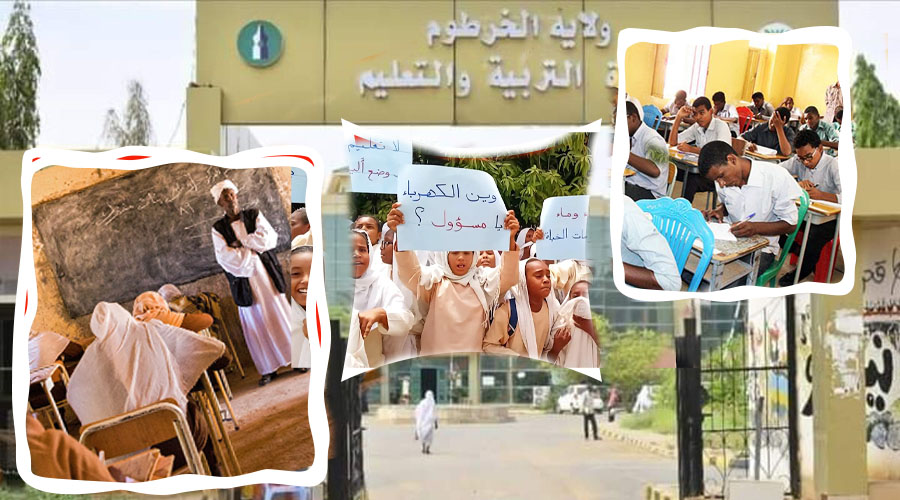
Khartoum State Schools: Will the New Academic Year Fail?
Khartoum - Moatinoon
Sudanese educational authorities acknowledged the major challenges facing the educational process in Khartoum State and the severe shortage of teaching positions in the state at the start of the postponed academic year (2024-2025). According to the SUNA News Agency (August 17, 2025), the Ministry of Education and National Education pledged to support the state with 5,000 teaching positions to fill the shortage. The Ministry noted that positions approved by the Ministry of Finance will be announced and offered by the state in accordance with its established procedures.
The Undersecretary of the Ministry of Education, Ahmed Khalifa Omar, revealed a severe shortage of textbooks and seating, and that there is an urgent need to rehabilitate and maintain 63 schools in Khartoum State, at a cost of 166,000 in the first phase. He indicated that 20 schools are designated for each locality, and that the total cost of all items, after the survey, amounted to 11,417,267.
The Khartoum State Government approved the start of the 2024-2025 school calendar in the state, with teachers starting school on Sunday, August 24. This aims to contribute to improving the school environment and addressing existing shortcomings. The final year of primary, intermediate, and secondary school will begin on September 7, 2024, with student registration continuing for the various grades, which will begin a week later.
Teachers Committees Online
In a joint statement regarding the announcement of the 2024-2025 school calendar in Khartoum State, the Sudanese Teachers Committees in Khartoum State localities demanded the settlement of financial arrears. Teachers still have over 14 months of salary arrears, in addition to holiday allowances and cash alternatives for two consecutive years, a 30% reduction in arrears for five months, and the activation of promotions that have been suspended for over three years.
In addition, the committees demanded ensuring that all schools are free of any hazards, including explosives or foreign objects, and that school facilities, including classrooms, offices, and bathrooms, are safe. They also demanded the provision of a suitable school environment that ensures the safety of students and teachers, while ensuring the availability of potable water, electricity, seating, and textbooks. They warned that the beginning of the school year is fraught with difficulties and jeopardizes its stability.
Osman Ahmed, a retired teacher, said he is not optimistic about the start of the school year in Khartoum State. The state has yet to recover, and all public schools are beset by serious problems and a severe shortage of teachers, while the educational environment itself is hostile. "It will fail. All the factors do not contribute to a successful school year," he said. He explained that he has not received his pension for the past two years and is currently working at a modest private school.
In a joint statement with the Youth Parliament, the Teachers Committee reiterated that the education system in Sudan is witnessing an unprecedented deterioration following the April 15 war, which left widespread destruction to the educational infrastructure and displaced millions of students. Returning to school has become a distant dream, given the ongoing insecurity, the worsening economic crisis, and the parties disregard for the future of an entire generation.
The statement affirmed an agreement to work together to ensure the comprehensive and safe return of students and to reform the education system throughout Sudan. It called for raising voices locally and internationally to demand an immediate ceasefire and the withdrawal of forces from educational institutions, by exerting pressure on the warring parties to secure safe passage for students and teachers.
The two parties decided to launch a joint campaign to mobilize financial support from civil society, international organizations, and donors to rehabilitate damaged schools and pay staff benefits, including the establishment of an "Education Support Fund" to ensure the continuity of the educational process and provide the necessary tools for teachers and students.
They also decided to cooperate on developing alternative and flexible curricula that are appropriate for the current circumstances, particularly distance learning, and to integrate curricula that promote the values of peace, tolerance, and community cohesion to address the psychological and social impacts of war. They also decided to support teacher training programs to equip them to address the psychological and social challenges of students affected by the conflict, particularly by strengthening the role of youth in rebuilding the education system by including them in planning and implementation committees.
The statement added, "We affirm that education is not just a right, but the sole foundation for Sudans future. We believe that returning students to school is the first step towards restoring normal life and building lasting peace. We therefore call on all political actors, international organizations, and civil society to support these efforts, as investing in education is an investment in the hope of the Sudanese people."
Education: Between Private and Public
A parent who returned from displacement to his home in Halfaya told Citizens that he preferred public schools, but found them still closed. He was forced to enroll his son and daughter in a private school, paying 350,000 Sudanese pounds, plus transportation fees for each, including books and uniforms, with a 150,000 Sudanese pound discount. "Although there are three primary public schools in Halfaya: the Southern, the Northern, and Aoun Al-Sharif Qasim, my childrens private school is surrounded by about six other private schools, which are fiercely competing to reduce fees and attract students."
For his part, Salah Abdullah, a resident of Wad Al-Bakhit in Karari locality, lists about 20 private schools in the area, compared to only two public schools: the Wad Al-Bakhit Boys and Girls Primary Schools. "The public schools are exhausted and lack many resources," Salah told Citizens. "Textbooks are not available at the school, and I cannot afford to buy all the books for the children because the price of a single book is 4,000 Sudanese pounds."

